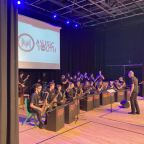
Art and science combine to explore workings of the human brain
Researchers from the arts and sciences are joining forces in a bid to explore one of the greatest scientific challenges of our time – the workings of the human brain.
Plymouth University’s new Cognition Institute draws together experts in topics as varied as experimental psychology and the creative arts, cognitive robotics and biomedicine.
It aims to bridge the gaps between the various disciplines and establish itself as a world-class, interdisciplinary research institute in human cognition.
Professor Sue Denham, Director of the Cognition Institute, said: “The Institute aims to connect core research areas in cognition with emerging fields which draw on understanding the role of the brain in human decision making, education, health and creativity. With an extensive portfolio of research projects, the Institute provides a powerful base for developing and enhancing interdisciplinary collaboration, and it has a wide ranging group of international collaborators who span the world.”
The Institute was launched by Plymouth University Vice-Chancellor Professor Wendy Purcell at a reception attended by its researchers and invited guests.
It also coincided with the University’s Festival of Research, and the Cognition Institute’s first international conference, The Lure of the New. The conference explored fundamental relationships between creativity, novelty and the way the brain works, with keynote speakers including Linda Lanyon, Head of Programmes at the INCF in Stockholm, and Professor Guy Orban, from the University of Parma.
It included topics such as creativity in dance and the computational modelling of brain processes, and speakers include Dr Alexis Kirke, who is rapidly gaining an international reputation for innovative compositions, such as his recent opera based on the financial markets.
The Cognition Institute will run a number of events throughout the year which are open to the public and Professor Denham, whose own research interests span neuroscience, music and psychology, said: “Involving the public in a dialogue about topical scientific issues is at the heart of our activities, and through the CogTalk debates and other innovative events we aim to engage a much wider audience in our research and add to the cultural life of the city.”
For more information about the Cognition Institute, visit www.plymouth.ac.uk/research/cognition.













